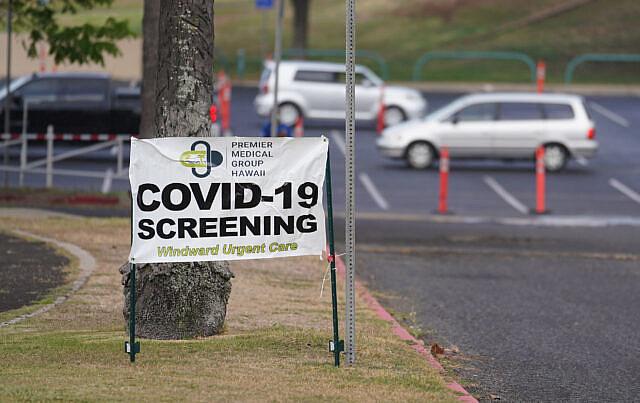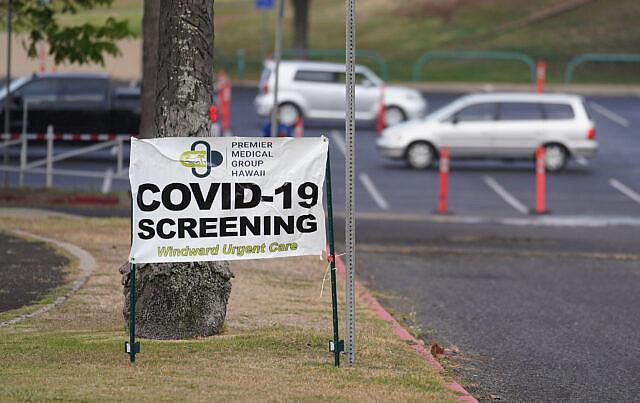Community Leaders: State Is Failing Pacific Islanders In The Pandemic
This article is part of a larger project by Anita Hofschneider, produced with support from the 2020 National Fellowship and a grant from the Dennis A. Hunt Fund for Health Journalism. All of her Fellowship project stories can be found here.
Her other stories include:
Hawaii's Pandemic: Hardest Hit Communities Part 1: Hawaii Wanted To Save Insurance Money. People Died
Hawaii's Pandemic: Hardest Hit Communities Part 2: Health Officials Knew COVID-19 Would Hit Pacific Islanders Hard. The State Still Fell Short
Hawaii Researchers: State Must Support Pacific Islanders In The Pandemic
Pacific Islanders Have The Highest COVID-19 Death Rate In Hawaii
Women Were Already Struggling At Work. The Pandemic Is Making It Worse
Here’s What Honolulu Is Doing To Test Hard-Hit Communities For COVID-19
Kalihi Has The Worst COVID-19 Outbreak In Hawaii. Here’s How The Community Is Responding
Hawaii COVID-19 Data For Race And Ethnicity Is Missing
Hawaii Pacific Islanders Are Twice As Likely To Be Hospitalized For COVID-19
Hawaii's Pandemic: Hardest Hit Communities Part 3: Pacific Islanders Can’t Return Home During COVID-19 — Even To Bury Their Loved Ones
Hawaii's Pandemic: Hardest Hit Communities Part 4: The Pandemic Is Hitting Hawaii’s Filipino Community Hard

COVID-19 rates in Hawaii are going up and Pacific Islander communities are hard hit.
Leaders of a community group dedicated to helping Native Hawaiians and other Pacific peoples address the pandemic in Hawaii want the state to hire Pacific Islander contact tracers and improve education and outreach to their communities.
The Native Hawaiian and Pacific Islander COVID-19 Response, Recovery, and Resiliency Team met with Sarah Park, the state epidemiologist, on Wednesday. But its four co-chairs told reporters Thursday that they came away discouraged.
“There was no movement or willingness to do anything different,” said Sheri Daniels, one of the co-chairs and executive director of Papa Ola Lokahi, a nonprofit dedicated to Native Hawaiian health.
Their recommendations include hiring Pacific Islanders to conduct education and outreach, and changing the education requirements for contact tracers to allow people who have worked in community health but perhaps don’t have college degrees to apply.
COVID-19 rates in Hawaii are going up and Pacific Islander communities are hard hit.
The group wants the state to provide more personal protective equipment like masks to their communities, and provide culturally appropriate public service announcements in targeted languages.
The organization also noted that no grocery stores accept food stamps for grocery deliveries and said there’s a need for gift cards to help quarantined families pay for food.
Daniels said they shared their recommendations with officials who weren’t willing to act on them.
Janice Okubo, spokeswoman for the Department of Health, did not reply to a request for comment or an interview with Park Thursday.
At a press conference with Gov. David Ige Thursday afternoon, officials announced that Park will no longer be leading the effort to trace and investigate the spread of COVID-19 cases. She’s been replaced by health department deputy director Danette Wong Tomiyasu.
Thirty percent of Hawaii’s confirmed coronavirus cases are affecting people from Pacific communities, excluding Native Hawaiians, even though they make up just 4% of the state population.
The Pacific Islander category refers to the Indigenous people of Melanesia, Micronesia and Polynesia. Native Hawaiians are in a separate category, and so far aren’t experiencing disproportionately high rates of COVID-19.
Joseph Keawe’aimoku Kaholokula, chair of the Native Hawaiian Health department at the University of Hawaii John A. Burns Medical School said he’s particularly frustrated with what he sees as politics getting in the way of a more effective response.
“It’s unfortunate that we come to this point where we have to call out our public officials,” he said.
Advocates for Native Hawaiian and Pacific Islander communities banded together months ago to form a coalition of more than two dozen community organizations aimed at improving outreach, education, data collection and other issues.
Sharing information in a culturally appropriate way is particularly important to Feleaʻi Tau, who works as a special assistant to Lt. Gov. Josh Green but was speaking Thursday in her capacity as a co-leader of the task force and a member of Hawaii’s Samoan community.
“I think they need to recognize that there are more complex issues going on that we can help with,” she said.
“I felt like we were not recognized as being resources,” echoed Josie Howard, the executive director of We Are Oceania. She added mixed messages from various political leaders are particularly confusing.
Read their full statement and list of recommendations below.
This story was produced with support from the USC Annenberg Center for Health Journalism National Fellowship and its Dennis A. Hunt Fund for Health Journalism.

